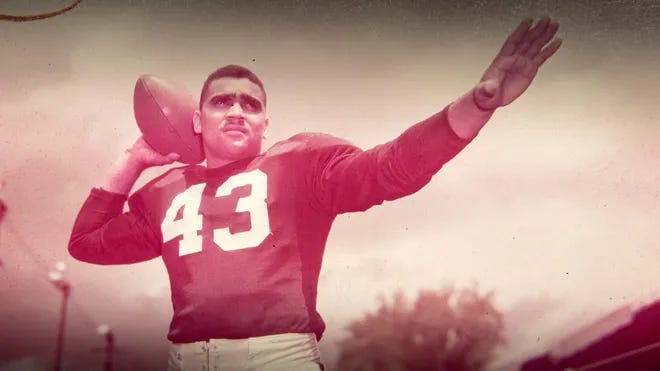Heartland: The Bright Path: The Johnny Bright Story
An illuminating documentary about the Fort Wayne football phenom who took every shot racism had to offer and still never let it stop him.
For Heartland Film Festival schedule and tickets, please click here.
Johnny Bright’s legend is filled with many amazing tales. The year he single-handedly accounted for 70% of his college football team’s yardage. The three consecutive championships won in the Canadian Football League. The way he moved on to education after hanging up his helmet, rising to become a high school principal revered by students and teachers alike.
Probably the single moment he’s most known for, unfortunately, was an excruciating act of violent racism.
The story of his Hoosier icon encompasses all the good and bad things that happened to Bright in “The Bright Path: The Johnny Bright Story,” a new hour-long documentary directed by Jerald Harkness.
Bright is not a household name these days, despite being a trailer-blazer for other Black football players like Warren Moon, one of many athletes and scholars who sing Bright’s praises in the film. That’s probably due to the fact that even though he was drafted fifth overall by the Philadelphia Eagles, Bright knew he would not be accepted by fans.
Instead, he chose the CBL and played there for 13 seasons, winning the most outstanding player award and the aforementioned championships with the Edmonton Eskimos.
An astonishing all-around athlete who could throw the ball as hard as he ran it, Bright would break the mold as a “splatter back” who could run right through opposing players with his mix of power and speed.
It’s not that he wasn’t ready for the NFL; it was just that the American football league — and the rest of the country — wasn’t ready for the likes of him.
During his senior year at Drake University, Bright was favored to win the Heisman Trophy after leading the country in yardage the two previous years. He had actually been recruited to Drake on a basketball scholarship, but with the proviso he could walk on for the football team. Back then, freshmen didn’t play, no matter how good they were.
But at a game at Oklahoma A&M (now Oklahoma State), Bright was targeted for vicious, illegal hits by opposing players who were known to be gunning for the Black Drake leader. Time-lapse photographs by the Associated Press showed them lining up to clock Bright in the face well away from the ball, shattering his jaw.
Their photojournalism, which would go on to win a Pulitzer Prize, sparked a national outcry over the racial targeting of an opposing player. Bright would be back a few weeks later, wearing a new helmet prototype with a face guard that would become the standard in collegiate and professional football. The missed time cost Bright the Heisman, but he never complained.
Consider that less than 30 years earlier, another Black college player, Jack Trice of Iowa, was quite literally murdered on the field by the other team, kicked so fiercely while on the ground his internal injuries would prove fatal. The documentary contextualizes this event early on so we understand how dangerous it was for Bright to step on the field.
Off the gridiron, he had to deal with the usual segregation B.S., forced to stay at a different hotel or eat in a separate place for his teammates. Teammate Ernest Dippel talks about how nobly Bright suffered these racist fools.
A number of other witnesses and authorities offer their testimony throughout the film, including Bright’s granddaughter Bre Johnson, sports authors and historians like William C. Roden, Jaime Schultz and Mike Chapman, and contemporaneous athletes like Drake hoops star Dolph Pulliam.
These folks do a very good of illuminating the kind of person Johnny Bright was, even taking away his guts and brilliance on the football field. Surprisingly, there is little footage of Bright speaking himself, so others have to bear witness for him.
“The Bright Path: The Johnny Bright Story” is not just a story about sports and racism, but also one of perseverance and human dignity. Bright took the worst shots in life, ones no man should have to endure, and never let it stop him.






